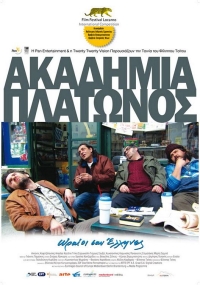Plato's Academy
|
דרמה, קומדיה
|
Every day Stavros raises the metal shutters of his cigarette store, puts out the newspapers in front and then sets out the chairs where he and his friends sit all day, looking out on the dusty intersection and surrounding grey buildings that shelter their businesses. They’re all very proud of the way their dog Patriot, on the opposite pavement, barks at every passing Albanian. Stavros and his friends don’t like these foreigners even if they’re willing to do the jobs the Greeks won’t do, nor do they like the recently arrived Chinese. By the store’s entrance, Stavros’ increasingly senile mother mopes in an armchair, regardless of the affectionate care lavished on her by her devoted son. Then one day she suddenly falls upon an Albanian worker, embracing him and calling him «my son» in Albanian. In fact, what does Stavros really know about his parents? His mother has always told him that after his father died up north, she moved to Athens, when he was but a year old. Now Stavros’ pals start looking askance at him: is he Greek or Albanian? Does he really have the right to sing the racist little ditty
ביקורות
כתוב ביקורת
כתוב ביקורת ותהיה הראשון לבקר את הסרט אקדימיה פלטונוס
קישורים
הוסף קישור
פרטים נוספים
טריילרים
תמונות
סרטים דומים
תגובות
כתוב תגובה ותהיה הראשון להגיב לסרט אקדימיה פלטונוס
10 הסרטים הפופולריים ביותר
1
מיינקראפט
2025
2
שלגיה
2025
3
סוגר פינות
2025
4
פינק ליידי
2024
5
תיק שחור
2025
6
איש הכלב
2025
7
משחק המעלית
2023
8
פדינגטון בג'ונגל
2024
9
הקוסם מארץ עוץ
2025
10
החתונה המרוקאית שלי
2023
צפה ברשימה המלאה

